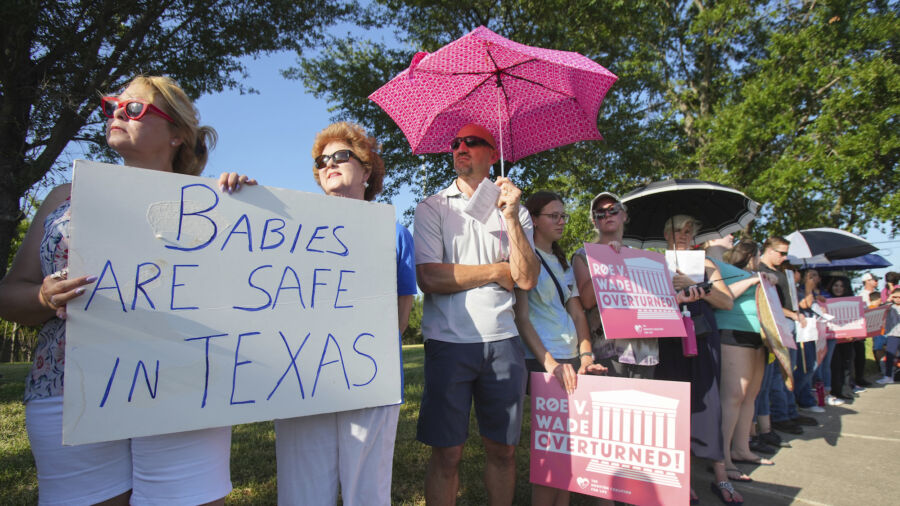A new report indicates there have been 5,377 fewer abortions on average each month in the first six months after the U.S. Supreme Court decision on abortion in the Dobbs v. Jackson Women’s Health Organization case.
The Society of Family Planning (SFP)—a non-profit organization that studies “abortion and contraception science” and has argued (pdf) for increased access to abortion medications—published a report (pdf) on Tuesday detailing the impact that the Dobbs decision has had on abortion throughout the United States.
SFP determined there were 32,260 cumulative fewer abortions between July to December 2022, based on a comparison of abortion trends before and after the Dobbs decision. That estimated reduction in abortions comes out to approximately 5,377 fewer abortions on average each month.
The Supreme Court’s decision in the Dobbs case overturned precedents set in the 1973 Roe v. Wade case and the 1992 Planned Parenthood v. Casey case. The ruling meant that individual states could set policy on aspects of abortion that are not already specifically covered under U.S. federal law.
The SFP study placed 13 states in a category of those that implemented near-total abortion bans, with those rules in place for at least four of the six months in the study period. SFP determined that those 13 states—Alabama, Arkansas, Idaho, Kentucky, Louisiana, Mississippi, Missouri, Oklahoma, South Dakota, Tennessee, Texas, West Virginia, and Wisconsin—saw 43,410 fewer abortions in the six-month period.
Among the 37 other states and the District of Columbia, there were an estimated 11,150 more abortions than before the Dobbs decision, slightly offsetting post-Dobbs abortion reductions in the other states. Some of those 37 states have imposed greater abortion restrictions but did not implement near-total bans in the immediate aftermath of the ruling.
Abortion Travel and Telehealth
While some states have tightened restrictions on abortions since the Dobbs decision, other states have reaffirmed and promoted their access to abortion procedures.
“Some states that had restrictions in place but were closer in distance to states that banned abortion also experienced surges in number of abortions provided by a clinician; examples include Minnesota (1,820 more abortions) and Kansas (1,240 more abortions),” the SFP report states. “The majority of states where abortion remains legal with few restrictions, especially on the West Coast and in the Northeast, did not experience surges in abortions. While the structure of our data is unable to confirm this, the data suggests that many abortion seekers living in restrictive states may have traveled to other nearby states for care.”
Colorado has some of the loosest abortion rules in the country, placing no limits on when the procedure can be done and requiring no medical reason for such a procedure.
The Colorado Department of Public Health & Environment recently released preliminary data indicating that 28 percent of abortions performed in the state last year were with nonresident patients, ABC 7 reported. Colorado is bordered by states with more strict rules on abortion like Utah, Wyoming, Nebraska, Kansas, and Oklahoma.
The SFP data also indicated an uptick in abortions provided through virtual telehealth clinics in 2022. There were approximately 3,610 telehealth-related abortions in the month of April before the Dobbs decision, representing approximately four percent of all abortions at the time.
That number increased to 8,540 in December, representing 11 percent of all U.S. abortions at the time and a 137 percent increase in the number of telehealth-related abortions compared to April.
Abortions could be further limited by federal court cases challenging the legality of abortion drugs like mifepristone.
Last week, U.S. District Judge Matthew J. Kacsmaryk, an appointee of President Donald Trump, approved an injunction pausing the U.S. Food and Drug Administration’s approval of mifepristone. Kacsmaryk granted the injunction amid allegations the FDA ignored scientific evidence and bowed to political pressure in its initial approval of the drug in 2000.


